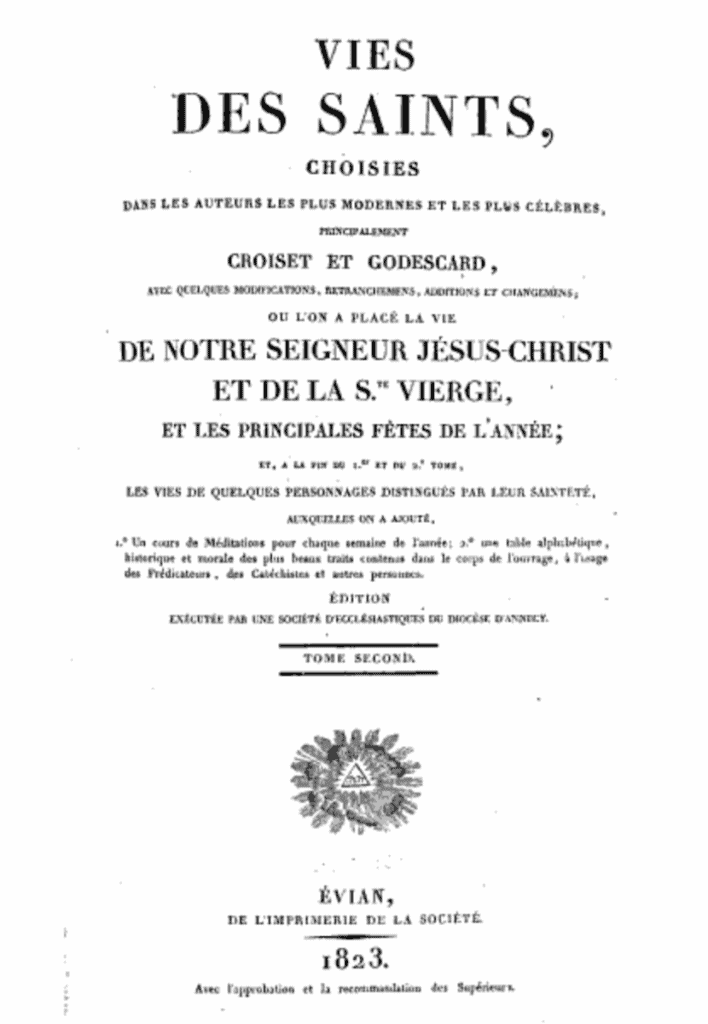When I was researching Saint Drogo, the Patron Saint of coffeehouse owners and coffeehouse workers for another article, I came across an old french book on the lives of the saints, Vies des saints choisies dans les auteurs les plus modernes et les plus célèbres,
principalement Croiset et Godescard which translates to Lives of the saints chosen from the most modern and famous authors, mainly Croiset and Godescard. This was written, compiled, and published in 1823.

Wait, is this about St Dreux or St Drogo?
It gets even more confusing! Drogo is the common Latin version of his name but he goes by Saint Druon in his native region of France, which used to be Flanders. In other areas of France, near Paris, for instance, he is known as Saint Dreux. There is an elegant coffee and sandwich shop in Melbourne, Australia that takes its name from this variant.

You may also see him referenced online as Druron but I feel confident that that is due to a typo in Wikipedia that has been copied numerous times. After long research into his life and the Roman Catholic registry of Saints, I found no mention of this variation on his name other than those that had been copied and pasted from the Wikipedia entry.
To read more about Saint Drogo, The Patron Saint of Coffee, follow the link! If you want to know why there is not God of Coffee (and maybe why there should be), I’ve you covered, too.
Why am I posting this?
There is no electronic version of this book, so I typed it out in French and then translated it into English. It seems a little stingy to not make it available to some future researcher.
Lives of the saints chosen from the most modern and famous authors, mainly Croiset and Godescard, 1823
Life of Saint Dreux
Patron of Shepherds
This Blessed Solitaire was born in the village of Epinoy in Artois, at the beginning of the twelfth century: history does not teach us who his parents were, it only says that they were people of high quality, and who possessed very great goods. He lost his father a little before his birth, and was also the cause at birth, of the death of his widowed mother being pregnant with him, fell into such affliction and such languor, that she did not have the strength to bring it into the world, and that it was necessary to open its side to pull it; which made this mother die giving life to her son. This accident so afflicted our Saint in his youth that he burst into tears when we spoke to him about it, and begged God for forgiveness, as if he had actually been guilty; presage of holiness and high predestination. In fact, the desire to make himself perfect grew so much in him with age that not content with mortifying his flesh by fasting and abstinence, he resolved to practice to the letter the advice that Jesus Christ gives in the Gospel. to those who want to be perfect. After having thus spent the first years of his life in the exercises of penance, and in works of charity towards the poor, he abandoned his country, his parents, his goods, and putting on a hairshirt under a simple tunic, which was all he reserved for himself, he undertook to live unknown in the world, and to triumph by a hidden life, its satisfactions, and all the vanities of the century.
With this in mind he sets off on a journey, and letting himself be led in the spirit of God, he arrives at the village of Sébourg two leagues from Valenciennes, and there he places himself at the service of a very virtuous Lady called Elizabeth at which he remained six years keeping the sheep and the flocks of several other inhabitants of the same place. Dreux discharged this post with so much humility, and so peacefully, that he made himself kind to all those in the village; and each admiring his modesty, his simplicity and his obedience, it was to whom he would give something; but he distributed everything to the poor, and reserved for himself only what was precisely necessary to live. His occupation during this exercise was to converse with God through continual prayer, and to meditate unceasingly on the divine mysteries of religion. Full of faith knowing that there is neither space nor walls for God, he turned to the side of the Church where he knew the holy sacrament, and from the place where he was, he adored it deeply; and doing the same prayers he would have made in a visit. Other times he would read the prayers of Mass as if he had been present, especially when he could hear the sound of the warning bell. At other times at the foot of a tree or in the bosom of a thick bush, he gave himself up to the meditation of some touching truth, or of some mystery; but let us note well, it was always without prejudice to the possessions around, and when his flock was in safety. His duty came before all devotion. Far from wasting time, which is so precious, and from exposing himself to talks or meetings with shepherds, if he did not pray, he was seen to be usefully engaged in whatever manual work he did either to avoid the danger. idleness, or to please God.
However, at the end of six years, to follow his attraction to retirement, austerities and pious devotions, he took leave of his mistress and the other inhabitants, and undertook the voyage to Rome to visit the holy places there. He made this pilgrimage up to nine times, almost without resting. Overwhelmed at the end of so much fatigue and afflicted with a harnie that travels had occasioned him, he was obliged to stop, but it was again to bring about another kind of life which would always unite him more to his God. He wanted to live alone, and for this purpose, he had a cell made up near the Church of Sebourg, and shut himself up there so as not to leave it for the rest of his life. As he could hear the divine offices from there, he did not fail to attend them with angelic devotion; so that we can say that he spent his whole life in prayer, and in singing the praises of God. His food was only a little barley bread, and his drink was pure water. If something else happened to him, he gave it to the poor without reserving anything for himself except the satisfaction of having only God alone. Finally, after having lived in this way for about forty-five years on earth, he left the prison of his body to enter into the freedom enjoyed by the children of God in Heaven. It was the year of Jesus Christ, 1186, and about his 80th age.
His parents, having learned of his death, demanded his body from the inhabitants of Sebourg. But the difficulties which arose there, obliged to bury him in the tomb which had already been prepared for him; it was since then that the Church which bore the name of Saint Martin, took that of Saint Dreux as well as the village.
Saint Dreux is particularly invoked for the healing of ruptures, descents, and stone; on this subject we can see several miracles in the story of his life, reported by the continuators of Bollandus, in the second volume of April. Among others the healing of Reverend P. Duvivier reported in the collection of Mirée which says that this Provincial at the age of 52 was healed of a rupture with which he had been afflicted for 17 years, then of a wish and a trip to his tomb.
The Roman Martyrology commemorates our Saint; as also Molan in his annotations on Usuard. His feast is celebrated in Flanders, the third holiday of Pentecost; but it does not take place until the eleventh of July at Epinoi where there is a Church built in his honor, at the very place where he was born.
The life of Saint Dreux is a touching example for the villagers and especially the shepherds. This Saint teaches them that their state is well compatible with holiness, and even that it is easier there than many other states, to lead an innocent life full of merits for Heaven, by offering them to God. various functions of this country life, and sanctifying it by some holy reflections. The campaign, by itself, carries the soul to rise to its author, and reminds us at every step, that we must ourselves be like the trees of the Lord, planted in his Church to be loaded with the fruits. of virtue and piety. Bless the Lord mountains and hills! bless him, shrubs that bear greenery and fruit. Fountains bless this God of goodness; birds of the sky, unite your voices here with those of the shepherds.
Conclusion
Well, if you made it this far, you must be curious. As I mentioned above, I wrote an article about Saint Drogo being the Patron Saint of Coffee and you can see it by following the link. I used multiple sources and have combined them into a coherent narrative so as to get a more complete story. Sadly, even though I went through all the trouble of typing the text from this book in French and then doing the translation to English (with the help of Google Translate), I did not uncover any link to coffee in this account of the life of Saint Dreux.

